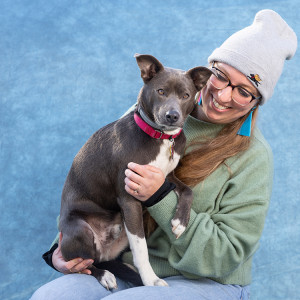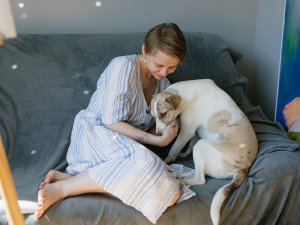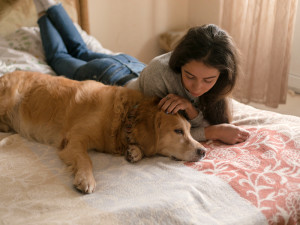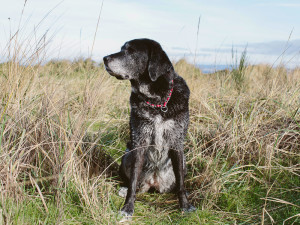Support Groups for Grieving Pet Parents Are on the Rise
The best medicine when you’re experiencing loss? Finding others who get it.

share article
Colleen Rolland was sobbing uncontrollably on the floor of her vet’s office the day she put her Golden Retriever, Maggie, to sleep. Her vet was sympathetic, but she wasn’t trained to help Rolland process her feelings, either in that moment or in the weeks, months, and years to come. So, like so many pet parents before her, Rolland was left to navigate her grief on her own.
Years later, when contemplating a career change, Rolland remembered that devastating day at the vet and decided she wanted to help people the way she wished someone had helped her. She started taking courses in pet grief counseling online, and eventually trained under Dr. Wallace Sifeopens in a new tab at the Association for Pet Loss and Bereavementopens in a new tab (APLB).
Dr. Sife has a PhD in psychology from New York University and founded the APLB in 1997. At that time, there weren't a lot of options for bereaved pet parents seeking help, so Dr. Sife, then in his 60s, started a chat room and would sit for hours in front of his computer, waiting for people to log in and talk about their loss.
“He really was a pioneer,” says Rolland, who took over as president of the APLB following Dr. Sife’s death from COVID-19 in 2020. “That chat room opens in a new tabhe started is still in existence and has helped over 70,000 people. Chat rooms have sort of gone out of style, but it’s still a great tool for people suffering from pet loss. It really helps them feel safe and seen.”
There is a huge need for pet-grief support.
Chat rooms and other grief support groups, whether they meet online or in person, allow the bereaved to connect with people who know what they are going through and can validate their feelings. Without that validation, bereaved pet parents can often feel like there is something wrong with them. Like their grief is somehow excessive. It’s not, of course. It’s just that pet loss grief is often disenfranchised grief, which means it isn’t accepted or validated by society at large.
When a human family member dies, most people will give you the time and space to feel the way you feel without judgment, but that is seldom the case for people grappling with the loss of a pet. Instead, they are often told by friends, family, coworkers, or even just casual acquaintances that they should just get over it and move on.
These people don’t necessarily mean to be cruel; they just don’t understand that for some people, the loss of a pet is as profound — if not more profound in some cases — than the loss of a human family member. And when those feelings are invalidated, they can leave the grieving person feeling more alone than ever. That’s why the support groups offered by APLB (and organizations like them across North America) are so important. They allow people to move through their grief without feeling ashamed or disregarded.
And the need for these groups is growing. “The number of clients I see has doubled since COVID,” Rolland says. “I think part of the reason is that during the pandemic a lot of people went out and got animals, or began spending a lot more time at home, bonding with the animals they already had. I also think pet grief support in general is becoming more recognized, so that people now know it is available to them.”
Most of APLB’s interventions are short-term — a way of helping people reframe their loss and progress through the stages of grief. “It’s amazing how often people just want to feel heard,” Rolland says. “They just want to have their pain validated. And often it only takes one session for them to start feeling better.”
Grieving people need support beyond the groups, too.
But sometimes a person’s grief is so profound that they need more help than Rolland and her colleagues can provide. Rolland trained under Dr. Sife, but she is not a psychologist herself, nor are most of her colleagues. So, they are careful to refer people to trained mental health providers when necessary. “We have to make sure we are helping people and not just holding a space for them that is not getting their needs met.”
Fortunately, these days, there are a number of trained psychologists who specialize in grief and pet loss and can offer more in-depth help to those who need it. Leigh Ann Gerk of Mourning to Light Pet Lossopens in a new tab in Loveland, Colorado, has a masters degree in family and marriage counseling from the University of Northern Colorado and is a certified pet loss and grief counselor. She began her practice after struggling to find help following the death of her own dog, Teddy. “At the time, I was working as a counselor at an inpatient hospital, and I didn’t understand why I couldn’t find anyone to help me with my grief,” she says.
She reached out to the company that performed her dog’s at-home euthanasia and asked if she could form a support group with them for people who had recently lost their pets. The company said yes, and the support group grew, until Gerk decided to go out on her own.
Grieving pet parents find community with each other.
Today, Gerk offers individual and family counseling to people who have recently lost a pet or anticipate losing a pet due to age or illness. She also runs two free in-person pet loss support groups at the Colorado State University Veterinary Teaching Hospital and the Greeley Community Grief Center.
Gerk sees clients of all ages, but says there is a particular need among the elderly, who often tell her their pet is the only one in their life who has shown them unconditional love. She says these clients often don’t have a lot of family and friends and that they experience “an extra hard sort of grief when they lose that pet, especially if they know they will not have another one. That this is the last time they will feel that particular kind of love. They are afraid to be alone and maybe they get confused or don’t make sense all the time when they talk, but their pets don’t care. They love them anyway.”
Losing that kind of connection and support is especially difficult when you don’t have a solid network to lean on. But that’s why these grief support groups are so effective. They bring people together. “It’s amazing how many people exchange numbers after, to have coffee or talk,” says Gerk. “They find that commonality with each other, which is so special. My groups also tend to have a lot of repeats, with people who started years ago coming back to try and help others.”
These groups are their own special kind of medicine.
Gerk and Rolland both say that the work has run its course when the bereaved are able to talk about their departed pets with more smiles than tears, although the pain of loss may never go away entirely.
“Dr. Sife used to say, ‘Time doesn’t heal all wounds; it just dulls the pain and makes them more bearable,’” Roland adds. And exactly how long the grieving process takes really depends on the person and the bond they shared with their pet. The important thing is not to judge yourself or let the judgments of others cause you to try to hide the weight of your own, legitimate grief.
“Do what brings you comfort,” says Gerk. “As long as you aren’t hurting yourself or anyone else, there really are no rules when it comes to grief. If leaving your pet’s bowls or bed out gives you comfort, do it. I had a client who left the cat hair on her curtains for years because it brought her comfort, and that’s really the goal. If you want to talk out loud to your pet, like they’re still there, that’s fine, too.”
And if you can’t find comfort on your own, don’t be afraid to ask for help. APLB offers free online support groups and a chat room you can access from anywhere. If you would prefer to talk to a trained therapist one-on-one, Google “pet loss counselors” or “grief counselors” more generally. They might not take insurance, but you won’t need them for long.
Find the kind of help that is right for you.
A grief counselor in your state also might be able to recommend you to someone who specializes in pet loss if they feel they are not able to help you themselves. Your vet can also be an excellent resource for recommendations.
In the meantime, if you’re struggling with the loss of a pet and want to take some sort of action on your own, Rolland and Gerk both suggest the same thing: Write your pet a letter. Write down everything you wish you could tell them in person. If you are feeling guilty, write about your guilt.
Tell them how much joy they brought to your life and how much you miss them. Tell them why they were and are so special to you. It doesn’t have to be done in a single sitting and you don’t have to share it with anyone, if you don’t want to. Just get those emotions out. Articulate those feelings. You’ll feel better when you do.

Charles Manning
Charles Manning is an actor, writer, and fashion/media consultant living in New York City with his two cats, Pumpkin and Bear. Follow him on Instagram @charlesemanningopens in a new tab.
Related articles
![A woman laying on the bed with her Golden Retriever dog laying next to her]() opens in a new tab
opens in a new tab8 Practical and Healing Ways to Remember Your Pet After They Pass
Even though it’s the last thing you want to think about.
![Man hugs his dog to his face]() opens in a new tab
opens in a new tabHow Will I Know When It’s Time?
End-of-life veterinary specialist Dr. Shea Cox on how to make the most difficult decision in your pet parenting journey.
![Grieving the death of a pet.]() opens in a new tab
opens in a new tabSeeing Ghosts of Their Dogs Can Help Grieving Pet Parents, New Study Says
People welcome paranormal activity if their pets are involved.
![Portrait Of Large, Senior, Mixed Breed Dog On Beach]() opens in a new tab
opens in a new tabHow to Grieve a Pet
For National Pet Memorial Day — Sept. 12th — we asked 5 grief experts how to cope with feelings of guilt after we lose a pet.
![A dog resting its face on a wooden table.]() opens in a new tab
opens in a new tabDo Dogs Grieve When Other Dogs Die?
A study confirms our pets can have heartbreaking reactions to the loss of a canine companion.
![an illustration of a big black cat cradling a small person. the cat is surrounded by three pink flowers]() opens in a new tab
opens in a new tabAshes to Ashes, Pet to Plant
The founders of Pleia, a startup that practices pet composting, on this method of honoring pets after death.







